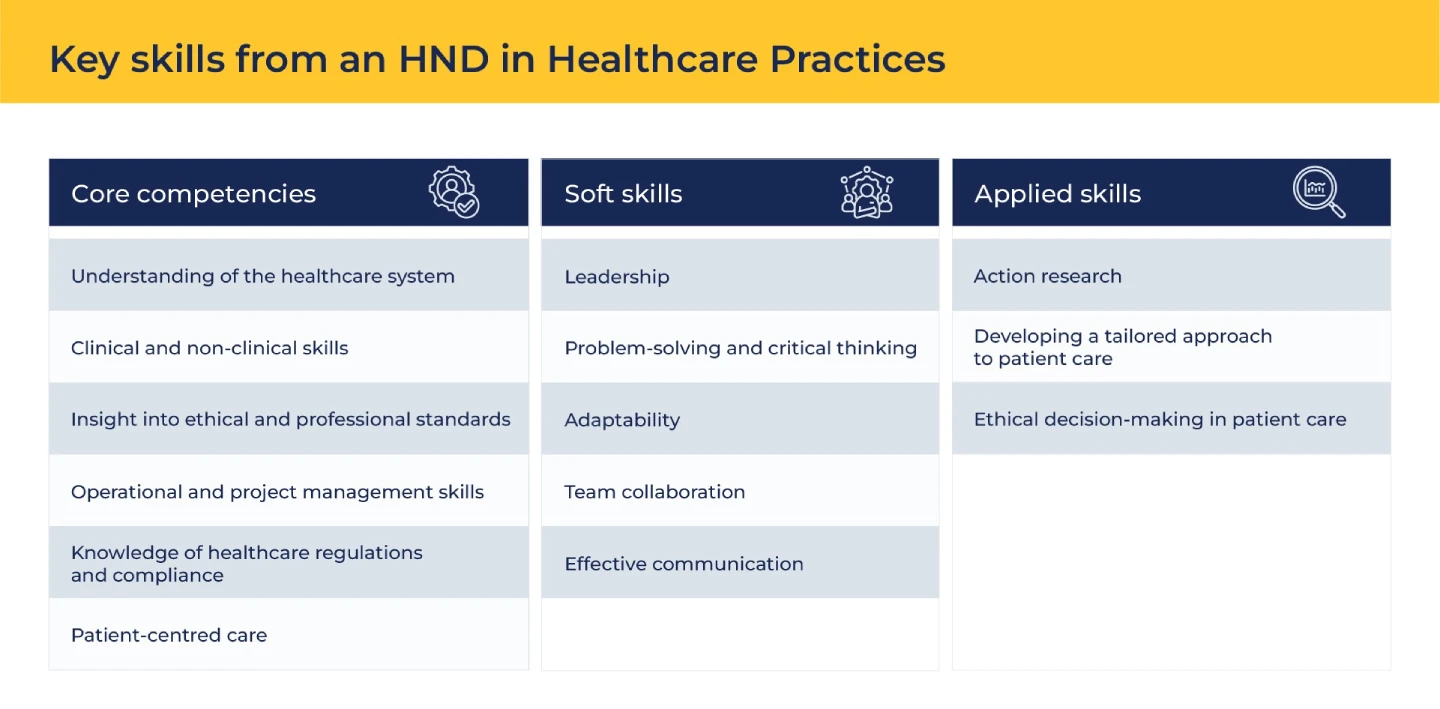What do healthcare practices cover in an HND?
The HND in Healthcare Practice offers a comprehensive curriculum that combines practical and theoretical approaches. The two-year programme consists of 240 credits, 120 credits per year. The first year of the programme, known as the higher national certificate (HNC), covers the basics of the healthcare sector, including healthcare law, ethical practice, social care, a Pearson-set project and others. It provides a strong foundation for students who are interested in a career in healthcare.
The second year of the programme focuses on core and specialist modules. These include reflective practice, quality management, human resource management (HRM) for healthcare, project management among others. It also includes a Pearson-designed project and a Pearson-designed practical assessment that each student must complete.
Here is a detailed breakdown of what healthcare practices cover:
| Year 1 - HNC |
| Units |
Focus area |
Key skill development |
| Law, Policy and Ethical Practice in Health and Social Care |
Understanding of the laws, rules and ethical values that govern the healthcare sector. |
Learning how to apply ethical codes of practice |
| Demonstrating Professional Principles and Values in Health and Social Care Practice |
This module focuses on developing professional principles and values. |
Professionalism, self-reflection, values-based care |
| Supporting the Individual Journey through Integrated Health and Social Care |
Learn about the holistic approach to healthcare, emphasising the importance of integrated care and supporting individuals. |
Care planning and holistic support |
| Fundamentals of Evidence-Based Practice (Pearson-set Project) |
This unit introduces principles of evidence-based practice and critical evaluation. |
Research skills, critical analysis and applying evidence to practice |
| Developing Operational Management Skills for Healthcare Practice |
Essential operational management skills, including planning, organising and leading healthcare teams |
Teamwork, leadership and organisational skills |
| Changing Perspectives on Public Health |
Understanding the landscape of public health and examining the factors influencing health outcomes. |
Understanding modern public health conditions |
| Effective Reporting and Record-Keeping in Health and Social Care Services |
Focuses on the importance of accurate and effective reporting and record-keeping in healthcare. |
Communication, documentation and information management |
| Year 2 - HND |
| Units |
Focus area |
Key skill development |
| Innovation and Improvement through Action Research (Pearson-set Project) |
Students explore ways to improve healthcare by performing action research. |
Action research, quality improvement and innovation |
| Reflective Approaches in Implementing Person-Centred Practice |
Students learn to reflect on their work and tailor their approach to suit each patient’s needs. |
Reflection, critical thinking and continuous improvement |
| Managing Quality in the Care Environment |
Focuses on quality management principles, focusing on high-quality care delivery. |
Quality assurance and evaluation |
| Facilitating Change in Healthcare Environments |
Students learn how to lead change and improve healthcare organisations. |
Change management, leadership and adaptability |
| Human Resource Management for Healthcare |
Look at how healthcare staff are hired, trained and managed. |
Human Resources (HR) skills, team management and recruitment |
| Global Health and Wellbeing |
Global health issues and what affects people's health in different parts of the world. |
Global perspectives, cultural competence and health determinants |
| Project Management for Healthcare |
Focuses on tools to simplify managing healthcare projects and resource allocation. |
Project planning, execution and evaluation |
There is no formal examination for this programme. However, students have to demonstrate their learning through continuous assessment methods. Assessment in this programme is practical and varied. These include presentations, work-based projects, professional discussions, onsite training and assignments, report writing, case studies analysis and creating a portfolio.
What skills do students gain through an HND in Healthcare Practice?
The HND in Healthcare Practice covers a wide range of skills essential for modern healthcare environments. They develop strong clinical and non-clinical abilities, including evidence-based practice, patient care and operational management.
The programme emphasises effective communication, teamwork and leadership, as well as the ethical and professional standards essential for healthcare environments. Students also acquire critical thinking, problem-solving, and decision-making skills, along with adaptability, resilience, and the ability to work collaboratively in multicultural and multidisciplinary settings.

These strengths and abilities ensure that students are ready for immediate employment. They can also choose to further their academic progression.
Internship and practical exposure in Dubai
One of the key benefits of pursuing an HND in Healthcare Practices in Dubai is its strong emphasis on practical learning. Students learn in a simulated clinical environment and work on real-life case studies. Moreover, they can also complete work-based projects that mirror actual healthcare scenarios, which boosts their confidence.
The programme also offers valuable internship opportunities through partnerships with hospitals, clinics and care centres. This gives students direct exposure to the healthcare industry. The training and internships offered are closely aligned with the healthcare regulations and systems of the UAE. By doing so, graduates will be well-prepared for immediate employment in healthcare.
Why choose Dubai for an HND in Healthcare Practice?

Studying in Dubai provides access to high-quality, internationally recognised qualifications, such as Pearson HND. The programme provides students with practical skills and industry knowledge, which are highly valued by employers throughout the world.
Dubai is an excellent place to study healthcare practices because of:
- International faculty and a diverse student community offer global perspectives.
- Its English-medium instruction, which makes it accessible to international students.
- Access to world-class facilities and a rapidly expanding healthcare job market.
- Multicultural exposure prepares graduates to work in diverse healthcare environments.
- Favourable business environment and career growth opportunities in the UAE’s thriving healthcare sector.
Students in Dubai have the advantage of studying at leading institutions such as GBS Dubai, which stands out for its formative, workplace-like learning environment and industry-aligned curriculum.
GBS Dubai’s HND in Healthcare Practice (Healthcare Management) course is designed to develop adaptable, self-reflective professionals ready to meet the demands of a fast-growing sector. The programme enhances academic and practical skills and opens doors to a wide range of career opportunities and further education.




